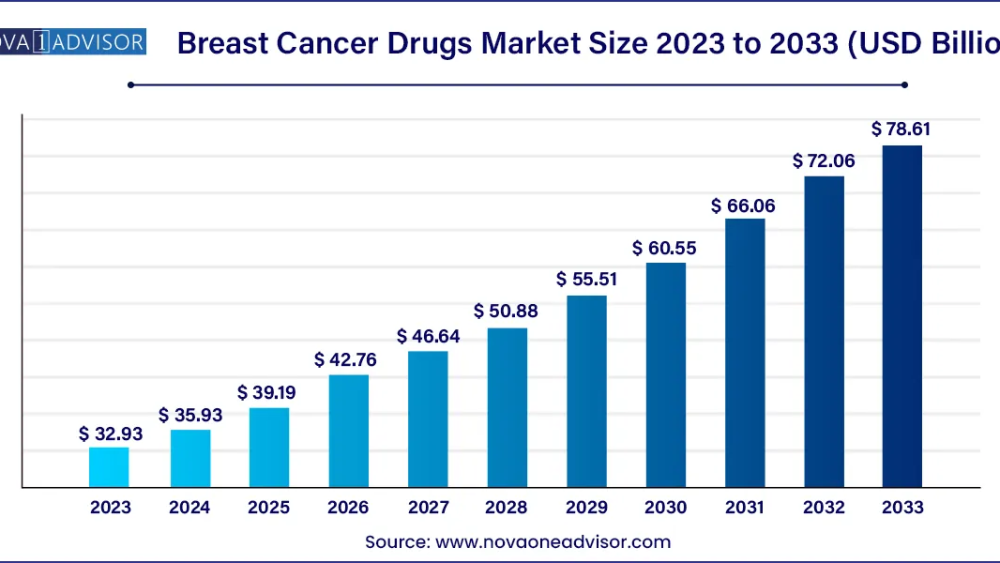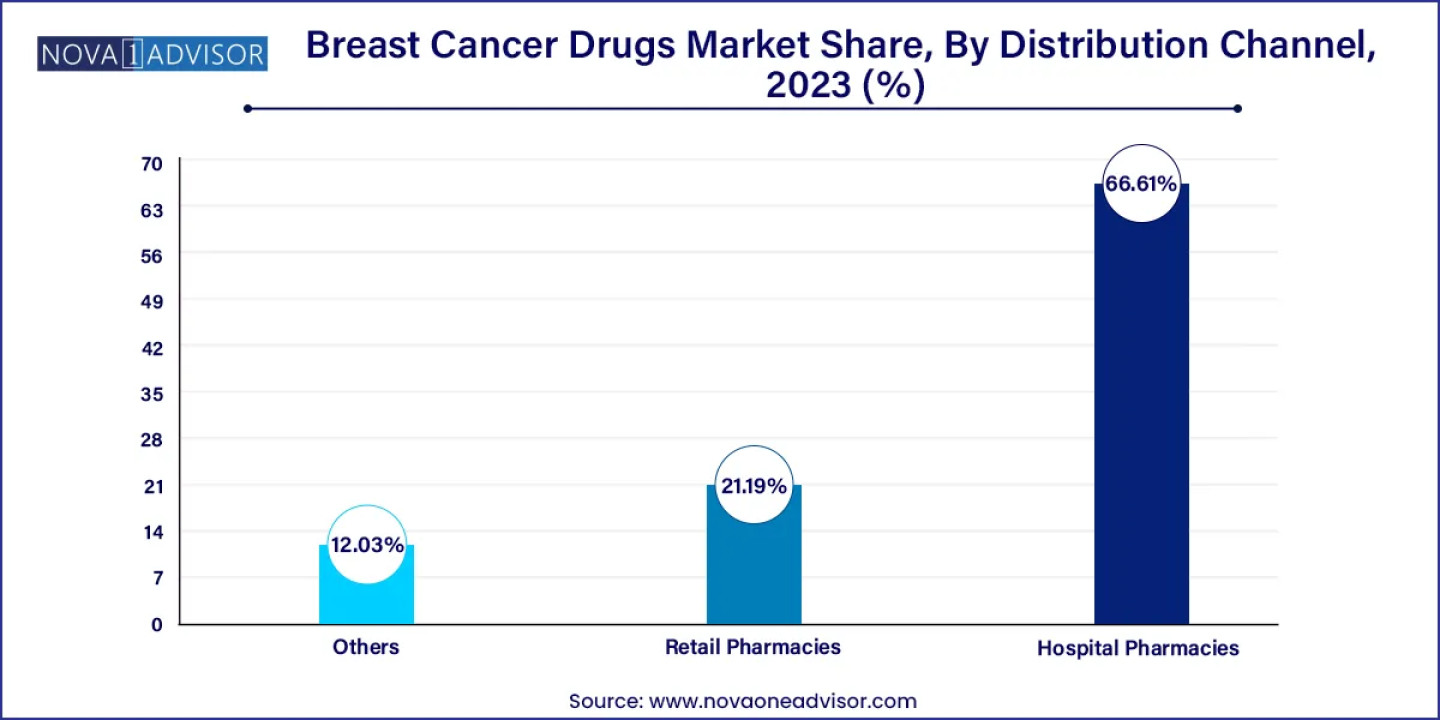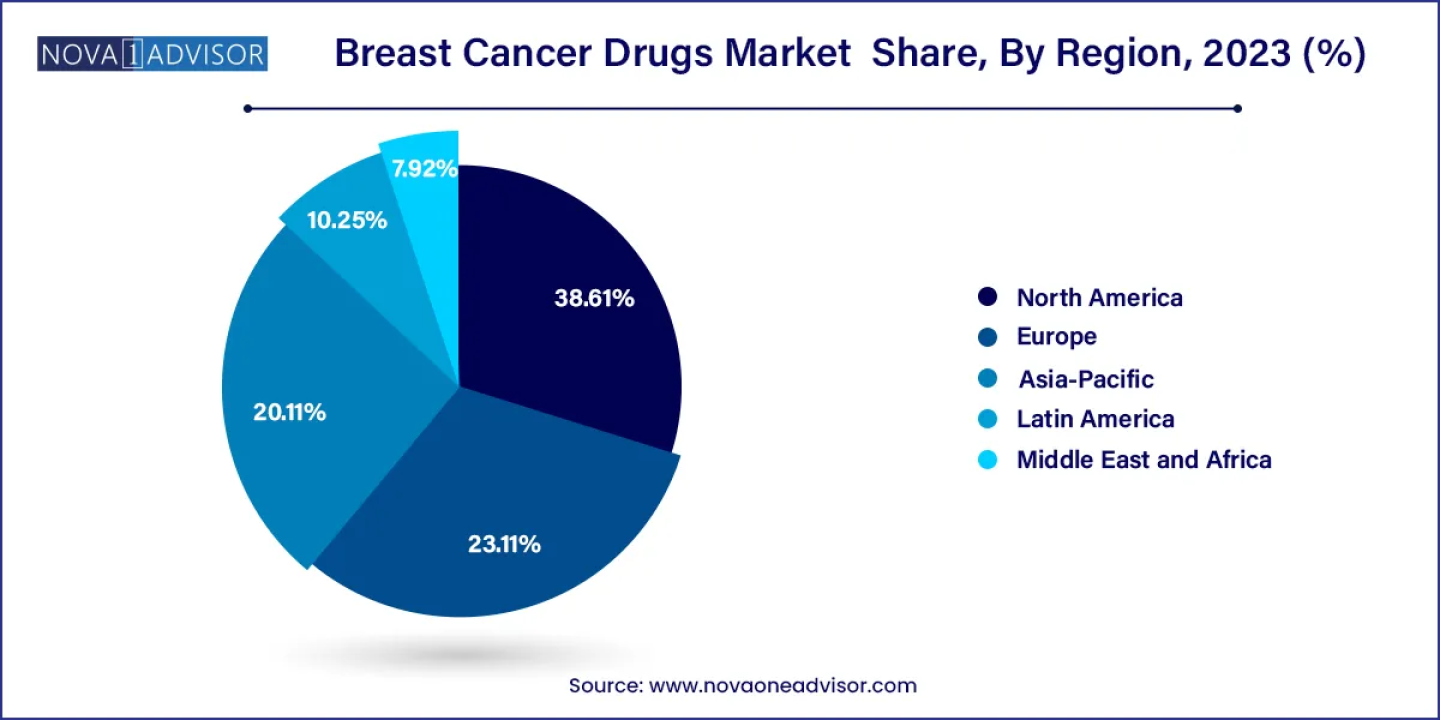The global breast cancer drugs market size was valued at USD 32.93 billion in 2023 and is projected to surpass around USD 78.61 billion by 2033, registering a CAGR of 9.09% over the forecast period of 2024 to 2033. North America dominated the market with the largest revenue share of 38.61% in 2023.
Get Sample Copy of Report@ https://www.novaoneadvisor.com/report/sample/8463
Chemotherapy, a vital component of breast cancer drugs market treatment, employs drugs to specifically target and eradicate cancerous cells within the breast.
The breast cancer drugs market is experiencing rapid expansion due to the diverse applications of drugs in various breast cancer treatment scenarios. Predominantly utilized before and after surgery, these drugs are pivotal in managing the disease. Significant research efforts are focused on targeted therapies tailored to specific breast cancer types, particularly those characterized by overexpression of human epidermal growth factor receptor 2 (HER2). HER2-positive breast cancers, constituting 15% to 20% of cases, exhibit heightened aggressiveness, necessitating targeted interventions. Targeted drug therapy, including immunotherapy, directly addresses proteins on cancer cells, impeding their growth and proliferation. With HER2-targeted drugs demonstrating efficacy in inhibiting tumour progression, the market witnesses a surge in the development and adoption of such therapies to meet the demand for more effective treatments in combating breast cancer.
https://www.novaoneadvisor.com/report/checkout/8463
Breast Cancer Drugs Market Dynamics
Driver
Rising Prevalence of Breast Cancer
Breast cancer, the second most common cancer globally, presents a significant market opportunity driven by several key factors. With breast cancer ranking as the most prevalent cancer in the U.S., affecting 1 in 8 women over their lifetime, heightened awareness and advancements in detection and treatment have significantly improved survival rates, with 90% of women surviving five years post-diagnosis. globalization and economic growth may contribute to increased incidence rates, particularly in developing countries where rates are projected to rise by 64% to 95%, and in developed countries with an expected increase of 32% to 56%. Demographic trends reveal distinct patterns, with urban areas seeing higher incidence rates among individuals aged 40–49, while rural areas report elevated rates in those aged 65–69. These demographic shifts, coupled with the imperative for earlier detection and more advanced treatment options, underscore the driving forces behind the continued expansion of the breast cancer drugs market.
Limitations of HER2 Targeted Therapy
Despite the promising efficacy of HER2 targeted drugs in breast cancer treatment, their usage is constrained by significant side effects, particularly in certain patient populations. Pregnant individuals are advised against taking these drugs due to the potential harm they pose to the fetus, which can even result in fetal death. Monoclonal antibodies and antibody-drug conjugates used in HER2 targeted therapy can induce heart damage, leading to congestive heart failure, a serious complication. This risk is heightened when these drugs are administered alongside chemotherapy agents known to cause heart damage, such as doxorubicin and epirubicin. Additional risk factors include age over 50, obesity, pre-existing heart conditions, and concurrent use of medications for hypertension. These limitations and associated risks act as restraints on the growth of the breast cancer drugs market, necessitating careful consideration of patient characteristics and potential adverse effects in treatment decisions.
Opportunity
Leveraging Artificial Intelligence in drugs Treatment
The emergence of artificial intelligence (AI) has catalyzed a transformative shift in breast cancer care, offering a wealth of opportunities for enhanced diagnosis and personalized treatment strategies. AI's integration across the diagnostic workflow, from screening to therapeutic response prediction, revolutionizes patient management by providing more accurate and timely insights. In radiology, AI applications in mammography, tomosynthesis, and risk prediction models bolster early detection efforts, while supplementary imaging methods like magnetic resonance imaging and ultrasound benefit from AI-driven advancements. Similarly, in pathology, AI facilitates pathologic diagnosis, biomarker evaluation, and predictions related to genetic alterations, treatment response, and prognosis. This comprehensive utilization of AI not only improves patient outcomes but also creates synergistic opportunities for the breast cancer drugs market, as precision medicine approaches become more refined and targeted therapies gain traction in clinical practice.
https://www.novaoneadvisor.com/report/checkout/8463
By Distribution Channel Insights
The hospital pharmacies segment held a significant revenue share of 66.61% in 2023 in the breast cancer drugs market, holding a substantial market share. Affordable Medicines and Reliable Implants for Treatment (AMRIT) Pharmacy stores within hospitals offer cancer drugs at discounted rates compared to the Maximum Retail Price, enhancing accessibility for patients. With a plethora of treatment options available for breast cancer, pharmacists play a crucial role in guiding patients and clinical teams through treatment decisions.
Challenges such as the need for long-term medication to prevent recurrence and inadequate post-treatment care persist, highlighting the importance of expanding breast cancer-focused services beyond traditional healthcare settings. This trend has created potential opportunities for community pharmacies to play a more significant role in addressing the growing demand for breast cancer care in the community setting, thus reshaping the distribution channel landscape in the industry.
By Therapy Insights
The targeted therapy segment captured the largest share of 64.85% in 2023. the breast cancer drugs market, poised to maintain its lead throughout the forecasted period. Targeted drug therapy, characterized by its precision in targeting proteins crucial for cancer cell growth and proliferation, offers a distinct advantage over traditional chemotherapy with its unique side effect profile. Monoclonal antibodies, a subset of targeted therapy, exhibit multifaceted mechanisms of action, often blurring the line between targeted therapy and immunotherapy by bolstering the immune response.
Biologic targeted therapy for breast cancer employs drugs designed to impede specific pathways essential for tumor progression, such as HER2 inhibition with Trastuzumab (Herceptin) or lapatinib (TYKERB). This tailored approach, honed to the individual pathophysiology of different breast cancer subtypes, signifies a paradigm shift towards more effective and precise treatment regimens for breast cancer patients, catalyzing advancements in therapeutic outcomes and patient care.
By Cancer Type Insights
In 2023, the hormone receptor segment was a significant contributor to the global market. The segment accounted for the largest share of 66.97% in 2023 the global breast cancer drugs market, serving as a substantial contributor to its growth. Hormone receptor-positive breast cancer, characterized by the presence of estrogen (ER) or progesterone (PR) receptors, represents a significant subtype effectively targeted by hormone therapy drugs. These medications function by either reducing estrogen levels or blocking estrogen receptors, thereby impeding cancer cell proliferation. Hormone receptor-positive cancers typically exhibit a slower growth rate compared to hormone receptor-negative counterparts, often leading to more favorable short-term outcomes for patients. despite initial treatment success, the potential for recurrence remains a concern, underscoring the ongoing need for effective long-term management strategies in breast cancer care.
Regional Insights
North America was the dominant region in the market with a revenue share of 38.61% in 2023, boasting a considerable market share. In Canada, breast cancer ranks as the most prevalent cancer among women, albeit rare in men. Its onset within mammary gland cells underscores its significant impact, with an estimated 28,600 new cases projected in 2022, resulting in 5,500 fatalities.
Similarly, the United States anticipates a substantial burden of breast cancer cases in 2023, with approximately 297,790 new diagnoses in women and 2,800 cases in men. With over four million women in the U.S. having a history of breast cancer, the market demand remains robust. Key players like Pfizer, Roche, Novartis, AstraZeneca, and Eli Lilly drive innovation and competitiveness in the North American market, contributing to its dynamic growth trajectory.
https://www.novaoneadvisor.com/report/checkout/8463
Some of the key players in the global breast cancer drugs market include:
This report forecasts revenue growth at country levels and provides an analysis of the latest industry trends in each of the sub-segments from 2021 to 2033. For this study, Nova one advisor, Inc. has segmented the Breast Cancer Drugs market.
By Therapy
Call: USA: +1 650 460 3308 | IND: +91 87933 22019 |Europe: +44 2080772818
Email: sales@novaoneadvisor.com
Web: https://www.novaoneadvisor.com/
Get Sample Copy of Report@ https://www.novaoneadvisor.com/report/sample/8463
Chemotherapy, a vital component of breast cancer drugs market treatment, employs drugs to specifically target and eradicate cancerous cells within the breast.
The breast cancer drugs market is experiencing rapid expansion due to the diverse applications of drugs in various breast cancer treatment scenarios. Predominantly utilized before and after surgery, these drugs are pivotal in managing the disease. Significant research efforts are focused on targeted therapies tailored to specific breast cancer types, particularly those characterized by overexpression of human epidermal growth factor receptor 2 (HER2). HER2-positive breast cancers, constituting 15% to 20% of cases, exhibit heightened aggressiveness, necessitating targeted interventions. Targeted drug therapy, including immunotherapy, directly addresses proteins on cancer cells, impeding their growth and proliferation. With HER2-targeted drugs demonstrating efficacy in inhibiting tumour progression, the market witnesses a surge in the development and adoption of such therapies to meet the demand for more effective treatments in combating breast cancer.
- In November 2023, Truqap (capivasertib) plus Faslodex was approved in the US for patients with advanced HR-positive breast cancer.
- North America was the dominant region in the market with a revenue share of 38.61% in 2023.
- The targeted therapy segment captured the largest share of 64.85% in 2023 and is expected to maintain dominance during the forecasted period.
- In 2023, the hormone receptor segment was a significant contributor to the global market. The segment accounted for the largest share of 66.97% in 2023.
- The hospital pharmacies segment held a significant revenue share of 66.61% in 2023.
https://www.novaoneadvisor.com/report/checkout/8463
Breast Cancer Drugs Market Dynamics
Driver
Rising Prevalence of Breast Cancer
Breast cancer, the second most common cancer globally, presents a significant market opportunity driven by several key factors. With breast cancer ranking as the most prevalent cancer in the U.S., affecting 1 in 8 women over their lifetime, heightened awareness and advancements in detection and treatment have significantly improved survival rates, with 90% of women surviving five years post-diagnosis. globalization and economic growth may contribute to increased incidence rates, particularly in developing countries where rates are projected to rise by 64% to 95%, and in developed countries with an expected increase of 32% to 56%. Demographic trends reveal distinct patterns, with urban areas seeing higher incidence rates among individuals aged 40–49, while rural areas report elevated rates in those aged 65–69. These demographic shifts, coupled with the imperative for earlier detection and more advanced treatment options, underscore the driving forces behind the continued expansion of the breast cancer drugs market.
- In January 2024, AstraZeneca India Pharma Ltd. officially launched Trastuzumab deruxtecan, tailored for the treatment of adult patients with unresectable or metastatic HER2 positive breast cancer who have previously received an anti-HER2 regimen.
Limitations of HER2 Targeted Therapy
Despite the promising efficacy of HER2 targeted drugs in breast cancer treatment, their usage is constrained by significant side effects, particularly in certain patient populations. Pregnant individuals are advised against taking these drugs due to the potential harm they pose to the fetus, which can even result in fetal death. Monoclonal antibodies and antibody-drug conjugates used in HER2 targeted therapy can induce heart damage, leading to congestive heart failure, a serious complication. This risk is heightened when these drugs are administered alongside chemotherapy agents known to cause heart damage, such as doxorubicin and epirubicin. Additional risk factors include age over 50, obesity, pre-existing heart conditions, and concurrent use of medications for hypertension. These limitations and associated risks act as restraints on the growth of the breast cancer drugs market, necessitating careful consideration of patient characteristics and potential adverse effects in treatment decisions.
Opportunity
Leveraging Artificial Intelligence in drugs Treatment
The emergence of artificial intelligence (AI) has catalyzed a transformative shift in breast cancer care, offering a wealth of opportunities for enhanced diagnosis and personalized treatment strategies. AI's integration across the diagnostic workflow, from screening to therapeutic response prediction, revolutionizes patient management by providing more accurate and timely insights. In radiology, AI applications in mammography, tomosynthesis, and risk prediction models bolster early detection efforts, while supplementary imaging methods like magnetic resonance imaging and ultrasound benefit from AI-driven advancements. Similarly, in pathology, AI facilitates pathologic diagnosis, biomarker evaluation, and predictions related to genetic alterations, treatment response, and prognosis. This comprehensive utilization of AI not only improves patient outcomes but also creates synergistic opportunities for the breast cancer drugs market, as precision medicine approaches become more refined and targeted therapies gain traction in clinical practice.
- In June 2023, The Max Foundation launched a program to provide treatment access for advanced breast cancer in nine countries across Africa, Latin America, and South Asia.
https://www.novaoneadvisor.com/report/checkout/8463
By Distribution Channel Insights
The hospital pharmacies segment held a significant revenue share of 66.61% in 2023 in the breast cancer drugs market, holding a substantial market share. Affordable Medicines and Reliable Implants for Treatment (AMRIT) Pharmacy stores within hospitals offer cancer drugs at discounted rates compared to the Maximum Retail Price, enhancing accessibility for patients. With a plethora of treatment options available for breast cancer, pharmacists play a crucial role in guiding patients and clinical teams through treatment decisions.
Challenges such as the need for long-term medication to prevent recurrence and inadequate post-treatment care persist, highlighting the importance of expanding breast cancer-focused services beyond traditional healthcare settings. This trend has created potential opportunities for community pharmacies to play a more significant role in addressing the growing demand for breast cancer care in the community setting, thus reshaping the distribution channel landscape in the industry.
By Therapy Insights
The targeted therapy segment captured the largest share of 64.85% in 2023. the breast cancer drugs market, poised to maintain its lead throughout the forecasted period. Targeted drug therapy, characterized by its precision in targeting proteins crucial for cancer cell growth and proliferation, offers a distinct advantage over traditional chemotherapy with its unique side effect profile. Monoclonal antibodies, a subset of targeted therapy, exhibit multifaceted mechanisms of action, often blurring the line between targeted therapy and immunotherapy by bolstering the immune response.
Biologic targeted therapy for breast cancer employs drugs designed to impede specific pathways essential for tumor progression, such as HER2 inhibition with Trastuzumab (Herceptin) or lapatinib (TYKERB). This tailored approach, honed to the individual pathophysiology of different breast cancer subtypes, signifies a paradigm shift towards more effective and precise treatment regimens for breast cancer patients, catalyzing advancements in therapeutic outcomes and patient care.
By Cancer Type Insights
In 2023, the hormone receptor segment was a significant contributor to the global market. The segment accounted for the largest share of 66.97% in 2023 the global breast cancer drugs market, serving as a substantial contributor to its growth. Hormone receptor-positive breast cancer, characterized by the presence of estrogen (ER) or progesterone (PR) receptors, represents a significant subtype effectively targeted by hormone therapy drugs. These medications function by either reducing estrogen levels or blocking estrogen receptors, thereby impeding cancer cell proliferation. Hormone receptor-positive cancers typically exhibit a slower growth rate compared to hormone receptor-negative counterparts, often leading to more favorable short-term outcomes for patients. despite initial treatment success, the potential for recurrence remains a concern, underscoring the ongoing need for effective long-term management strategies in breast cancer care.
Regional Insights
North America was the dominant region in the market with a revenue share of 38.61% in 2023, boasting a considerable market share. In Canada, breast cancer ranks as the most prevalent cancer among women, albeit rare in men. Its onset within mammary gland cells underscores its significant impact, with an estimated 28,600 new cases projected in 2022, resulting in 5,500 fatalities.
Similarly, the United States anticipates a substantial burden of breast cancer cases in 2023, with approximately 297,790 new diagnoses in women and 2,800 cases in men. With over four million women in the U.S. having a history of breast cancer, the market demand remains robust. Key players like Pfizer, Roche, Novartis, AstraZeneca, and Eli Lilly drive innovation and competitiveness in the North American market, contributing to its dynamic growth trajectory.
- In November 2023, the FDA approved capivasertib with fulvestrant for breast cancer treatment.
- Breast Cancer Diagnostics Market: https://www.biospace.com/article/breast-cancer-diagnostics-market-size-share-and-growth-report-2033/
- Antibiotics Market: https://www.biospace.com/article/releases/antibiotics-market-size-to-reach-usd-85-80-billion-by-2033/
- Genomics Market: https://www.biospace.com/article/releases/genomics-market-size-to-hit-usd-157-47-billion-by-2033/
- Oncology Market : https://www.biospace.com/article/releases/laxman-dige-precedenceresearch-com/
- In December 2022, Sanofi and Innate Pharma extended their partnership in cancer therapeutics. The collaboration aimed to further advance innovations in cancer treatment.
- In December 2023, Stratipath and Proscia announced a partnership, paving the way to bring relapse risk prediction to more breast cancer patients.
- In February 2024, Pfizer Oncology hosted Innovation Day, highlighting its fully integrated organization, robust portfolio, and strategic priorities to drive long-term sustainable growth.
- In January 2024, BioNTech and DualityBio initiated a pivotal Phase 3 trial of antibody-drug conjugate candidate BNT323/DB-1303 in metastatic breast cancer.
- In June 2023, Novartis reported that Kisqali significantly reduced the risk of recurrence by 25% across a broad population of patients with early breast cancer.
https://www.novaoneadvisor.com/report/checkout/8463
Some of the key players in the global breast cancer drugs market include:
- Novartis AG
- Pfizer Inc.
- Merck KGaA
- Janssen Pharmaceuticals, Inc.
- Celgene Corporation, Inc.
- Genzyme Corp.
- F. Hoffmann-La Roche Ltd.
- AstraZeneca
- AbbVie Inc.
- Bristol-Myers Squibb Company
- Macrogenics, Inc.
- Celldex Therapeutics
- Onyx Pharmaceuticals Inc.
This report forecasts revenue growth at country levels and provides an analysis of the latest industry trends in each of the sub-segments from 2021 to 2033. For this study, Nova one advisor, Inc. has segmented the Breast Cancer Drugs market.
By Therapy
- Targeted Therapy
- Abemaciclib
- Ado-Trastuzumab Emtansine
- Everolimus
- Trastuzumab
- Ribociclib
- Palbociclib
- Pertuzumab
- Olaparib
- Others
- Hormonal Therapy
- Selective Estrogen Receptor Modulators (SERMs)
- Aromatase Inhibitors
- Estrogen Receptor Down regulators (ERDs)
- Chemotherapy
- Immunotherapy
- Hormone Receptor
- HER2+
- Hospital Pharmacies
- Retail Pharmacies
- Others
- North America
- Europe
- Asia-Pacific
- Latin America
- Middle East & Africa (MEA)
Call: USA: +1 650 460 3308 | IND: +91 87933 22019 |Europe: +44 2080772818
Email: sales@novaoneadvisor.com
Web: https://www.novaoneadvisor.com/




